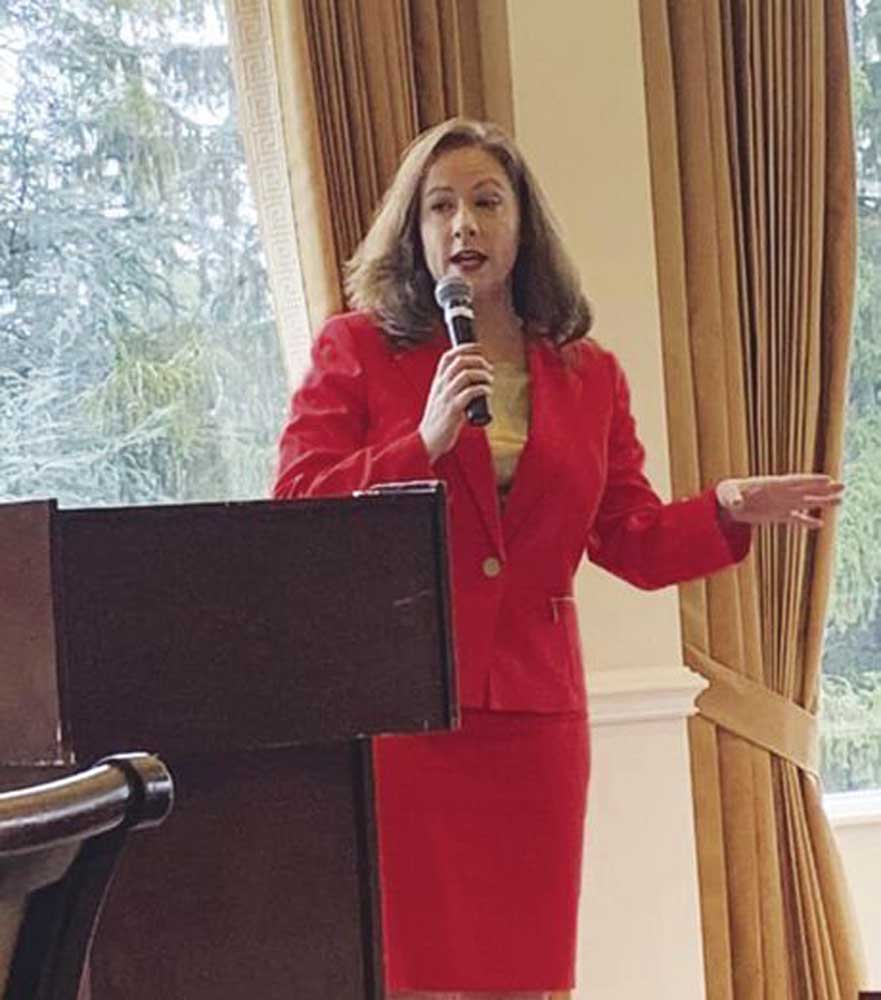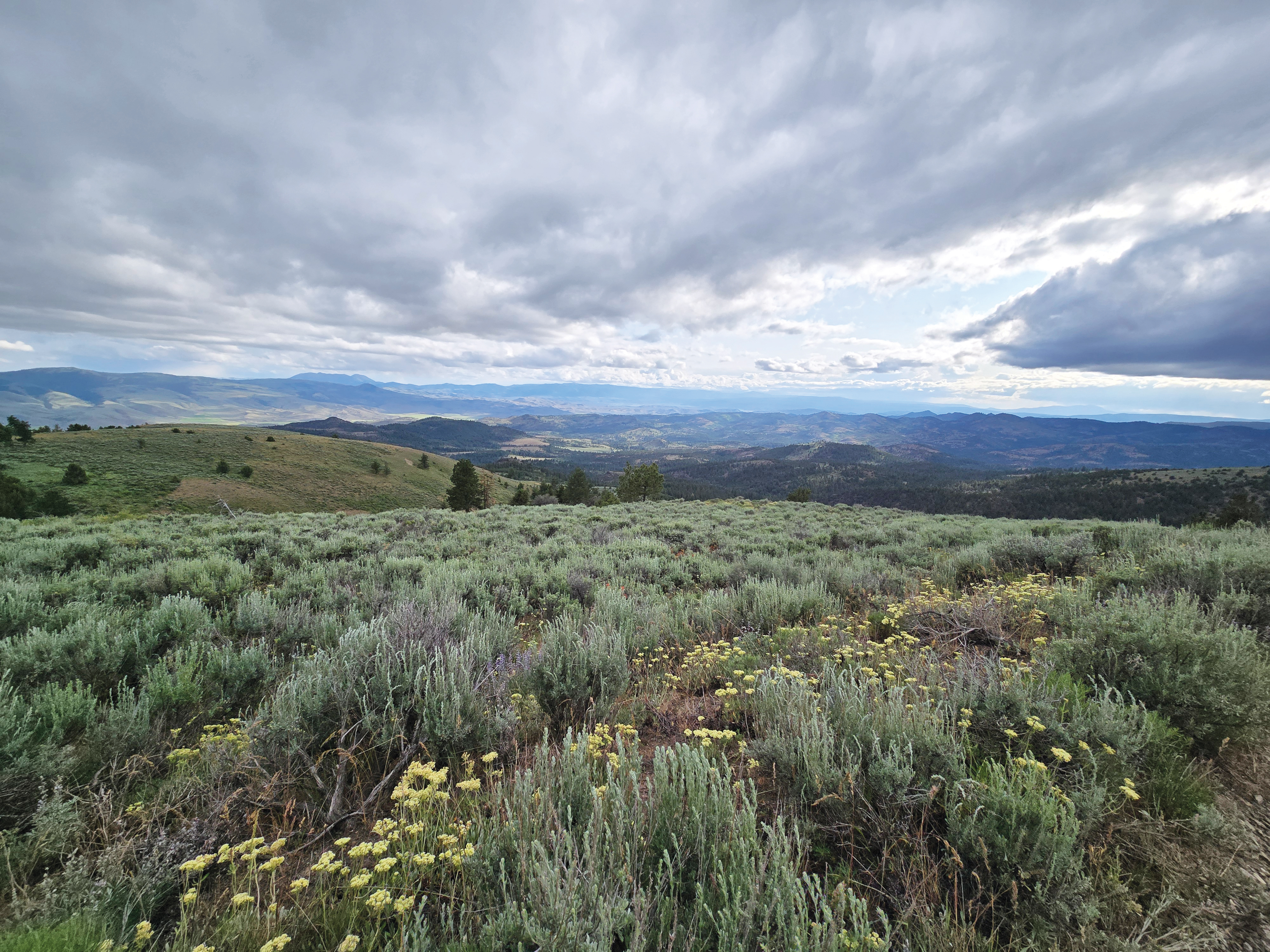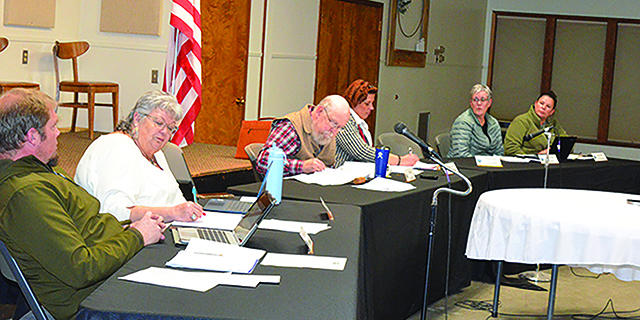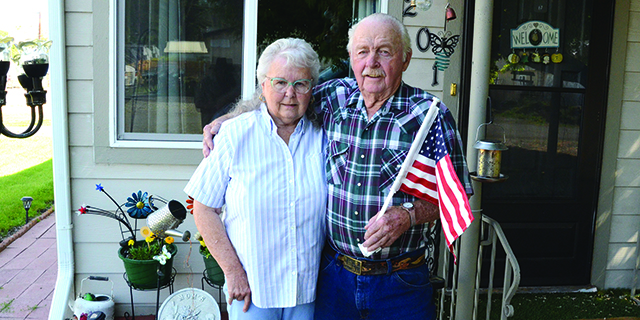‘A life-changing experience’
Published 9:00 am Saturday, January 29, 2022

- McQuisten speaks.jpg
BAKER CITY — Kerry McQuisten has met many thousands of Oregonians during her campaign to be the state’s next governor, a blur of faces and handshakes and forums and events in each of the 36 counties in the 10th-biggest state.
But one face remains especially vivid in her memory.
And she suspects that it always will be.
McQuisten, a seventh-generation Baker County resident who is seeking the Republican nomination in the May 22 primary, was in Tygh Valley, near The Dalles, for the Wasco County Fair in late August.
An older gentleman approached.
He was wearing a cap identifying him as a military veteran.
The man pulled out his wallet, reached in and extracted the only bill tucked in the folds.
It was a $5.
He handed the bill to McQuisten, insisting that she take it.
“Something has to change in Oregon,” the man told her.
“I will never forget it,” McQuisten said in an interview on Wednesday, Jan. 26.
That moment in the wheat country of Wasco County, one of so many in seven months of campaigning, continues to inspire McQuisten.
It’s not the amount of the donation, of course.
But that brief conversation, and the man’s insistence that she accept his modest contribution, convinced her then, and reminds her still, that some of her fellow Oregonians believe she can help to fix some of the problems that she — and they — believe are plaguing the state.
“My campaign is steadily gaining traction,” said McQuisten, who is Baker City’s mayor, elected to that position by her fellow Baker City Council members in January 2021. “I’m reaching out across the whole state.”
Amassing the miles
McQuisten didn’t anticipate how familiar her favorite oil change place would become.
She doesn’t know precisely how many miles she has driven since she declared her candidacy in late June of 2021.
“I didn’t even start paying attention until I was at 10,000 miles,” McQuisten said with a chuckle.
She’s been changing the oil in her car every three or four weeks.
“The people at the oil change place know my first name now,” she said. “They didn’t before.”
McQuisten, 49, said those miles are at least as important, and perhaps even more so, than the dollars her campaign has accumulated.
Although she acknowledges that advertising is vital to any candidate — she’s bought space on 11 billboards, is planning TV ads and also uses social media as a platform — McQuisten said there is no substitute for meeting people, shaking their hands and listening to their concerns.
“That’s how you excite your base, and you have to do that with Republicans,” she said. “You have to have that grassroots support. I’m meeting an awful lot of people.”
McQuisten, who grew up on a cattle ranch in Baker County, graduated from Willamette University in Salem and also lived for a year or so in Wilsonville, said she had been to each of Oregon’s 36 counties before she started her campaign.
But that happened over decades of normal travels.
Now she has been to every county in little more than half a year — and some she’s visited four or five times, to meet with residents at informal events or to participate in forums featuring multiple Republican candidates.
A unique opportunity for a Republican
After so many miles and so many meetings, McQuisten said she is even more confident now than she was when she started that 2022 presents an opportunity that Republicans haven’t had in Oregon for more than four decades.
No member of her party has been elected governor since November 1982, when Victor Atiyeh won the second of his four-year terms.
But McQuisten believes that voters are more dissatisfied with their state’s condition under the leadership of Democratic governor Kate Brown than at any time since Atiyeh’s tenure.
Brown’s executive orders during the pandemic, with their effects on businesses and schools in particular, have seriously weakened the Democrats’ once-indomitable electoral foundation, McQuisten believes.
“The more Kate Brown mandates, the worst it gets for the Democrats,” McQuisten said.
And although Brown can’t run for reelection due to term limits, McQuisten contends that the Democratic nominee, whoever that is, will be linked to Brown’s legacy, to the benefit of the Republican on the November general election ballot.
(McQuisten thinks Tina Kotek, the former Speaker of the House in the Oregon Legislature, is the Democratic frontrunner.)
McQuisten said she has talked with, and received emails from, many Democrats and nonaffiliated voters who are troubled by what’s happening in Oregon.
She was surprised to receive a $25 donation from an Ontario Democrat who voted for, and formerly supported, Brown.
“That’s when you know something is really shifting,” McQuisten said.
She said a few issues have come up at virtually all of her campaign events, concerns that seem universal in the state.
Public safety is one of these.
McQuisten said she’s talked with many people, including in Democrat-dominated Portland, who are incensed by violence, including the widespread rioting in Portland during the summer of 2020, and a record number of murders — 90 — in the state’s largest city in 2021.
“People don’t feel safe,” she said.
Oregonians are angry not only about the level of violence, McQuisten believes, but also by what some consider a milquetoast response by prosecutors.
And although criminal prosecution typically is handled at the county level, by district attorneys, McQuisten contends that Brown has failed to show leadership in the midst of the violence.
McQuisten points out that state law allows the state, through its Department of Justice, to prosecute cases that district attorneys decline to take on.
The problem of homeless residents camping on public property is no longer confined to larger cities, McQuisten said, citing another issue she believes Brown has not addressed forcefully enough.
“I talked to people about homeless camps in the forests around La Pine,” McQuisten said, talking about the town in Deschutes County about 30 miles south of Bend. “People don’t feel safe going for a walk in the woods.”
Where there’s smoke — everywhere
Wildfires are a frequent topic of discussion — and complaints — during her campaign events, McQuisten said.
“That affects every single area of the state,” she said.
Although McQuisten acknowledges that wildfires frequently burn on public land managed not by the state but by federal agencies — especially east of the Cascades — she believes Brown has failed to advocate for work that could reduce the fire risk and prevent most of the state from being cloaked in smoke for weeks.
McQuisten contends that Brown’s reaction to wildfires, including the devastating blazes that affected several parts of Southern and Western Oregon over Labor Day weekend in 2020, has been misguided.
The governor, McQuisten believes, has blamed climate change rather than calling for logging to reduce the amount of fuel in forests.
“She can get in there and advocate on federal issues — but she doesn’t,” McQuisten said of Brown.
McQuisten said she also has met many parents who are chagrined about some aspects of public education in Oregon.
“There’s an overall feeling that it’s become more of a focus on indoctrination than it should be,” said McQuisten, whose daughter is in a homeschool group.
McQuisten said she believes public schools should be a “neutral learning environment” that eschew both political and religious topics in favor of teaching reading, writing, math and science.
Oregon’s political divide
As a native of Eastern Oregon, McQuisten is familiar with the complaint that this side of the state is isolated from, and ignored by, the political power structure in the Willamette Valley, where most of the state’s residents live.
But during her campaign she said she’s come to understand that the divide is not “east-west,” but rather “urban-rural.”
McQuisten said she hears “exactly the same thing” — that the Legislature and the governor are dismissive of the concerns of rural residents — in every part of Oregon, including in the rural areas of Western Oregon counties where most of the residents live in one or two cities.
This general dissatisfaction is galvanized by certain specific topics, she said, including the aforementioned management of public lands and public education, as well as the protection of Second Amendment rights.
Pondering the primary and general elections
McQuisten, of course, won’t have a chance to try to break the Democratic Party’s 40-year run of victories in the general election unless she wins the Republican nomination in the May 22 primary.
She’s optimistic about her position.
In a recent straw poll from Oregon Catalyst — one McQuisten herself on her Facebook page notes has a “huge” margin of error — she polled second with 27.9%. The frontrunner was Stan Pulliam, the mayor of Sandy, east of Portland, with 41.3%.
Pulliam has a significant advantage in fundraising, as well.
According to campaign finance reports as of Jan. 12, Pulliam’s campaign had a cash balance of $264,258, compared with McQuisten’s $60,493.
Two Republicans topped Pulliam’s balance — Christine Drazan, House Minority Leader who is resigning from the Oregon Legislature Jan. 31, with $702,138, and Bridget Barton, a political consultant from West Linn, with $345,208.
But McQuisten said she’s confident that her grassroots campaign, relying on traveling across the state and meeting as many people, and voters, as possible, can overcome both her financial disadvantage and her lack of name recognition, at least compared with Drazan, a longtime legislative leader.
McQuisten believes 2022, with the unprecedented effects of the pandemic, is different, and that a Republican running her kind of campaign can beat what she calls “establishment” Republicans such as Drazan.
McQuisten noted that the field of Republican candidates, which once numbered 16, has dwindled to 12.
And one of those who have dropped out — Jim Huggins — has endorsed McQuisten.
“I consider that an honor,” she said.
As for the general election, the usual Democrat vs. Republican race — a contest the Democrats have dominated since the Reagan administration — is shaping up to be quite a different matter this summer and fall.
That’s because Betsy Johnson, a longtime Democratic state legislator, intends to run as a nonaffiliated candidate in the general election. Johnson has almost $3 million for her campaign.
McQuisten said that although Johnson, who is a moderate Democrat, will siphon some Republican votes, she believes Johnson will take more from the Democratic candidate in the general election.
The Johnson effect could carve a path for a landmark Republican win in November, so long as the GOP voter turnout is high, McQuisten said.
“The numbers are there,” she said.
Experience of a lifetime
McQuisten is a first-time gubernatorial candidate, but she’s hardly a political novice.
Her mother, Suzan Ellis Jones, who lives in Baker County, has worked on many campaigns, including for president Ronald Reagan and congressman Greg Walden.
McQuisten worked on Kevin Mannix’s gubernatorial campaign in 2002, and on Dennis Richardson’s run for governor in 2014.
McQuisten said she expected that running for governor would be a unique endeavor, and it has been.
“It’s a life-changing experience,” she said. “There’s also a spiritual aspect of this for me. I wonder, will God allow me to come in and be the person to change things, or will we have more of the same in Oregon.
“I don’t know,” she said. “Sometimes I feel like I’m driving at night on a dark road with the headlights on. I go on as far as I can see, and then go on from there.”
McQuisten said she knew that running a consistent statewide campaign would be demanding, “mentally, emotionally and spiritually.”
But she said she wasn’t quite prepared for the purely physical challenge of spending so many hours on the road, away from home.
“Physically it does take its toll,” she said. “It’s taxing.”
But the exhaustion is balanced with rewards, some of which she neither expected nor has been able, thus far, to become accustomed to.
It first happened not long ago during a trip to Salem, and McQuisten tells the story with the rueful smile of a person who still can’t quite believe what transpired.
She had parked her car and was walking on a sidewalk.
Someone passed, did a double-take and called her by name.
“I was recognized,” McQuisten said. “It was surreal.”
Since then a few other people have hailed her, asking if they could pose with her for a photo, asking for an autograph, saying they support her candidacy.
McQuisten said those episodes felt strange because she is a “very grounded” person who sees her campaign as a form of public service, not a boost to her ego.
But she was also grateful to the people who recognized her.
“It tells me that we have new traction across the state,” she said. “That’s what a campaign boils down to — how many people you can get in front of and get your message to.”
“My campaign is steadily gaining traction. I’m reaching out across the whole state.”
— Kerry McQuisten, Republican candidate for Oregon governor






